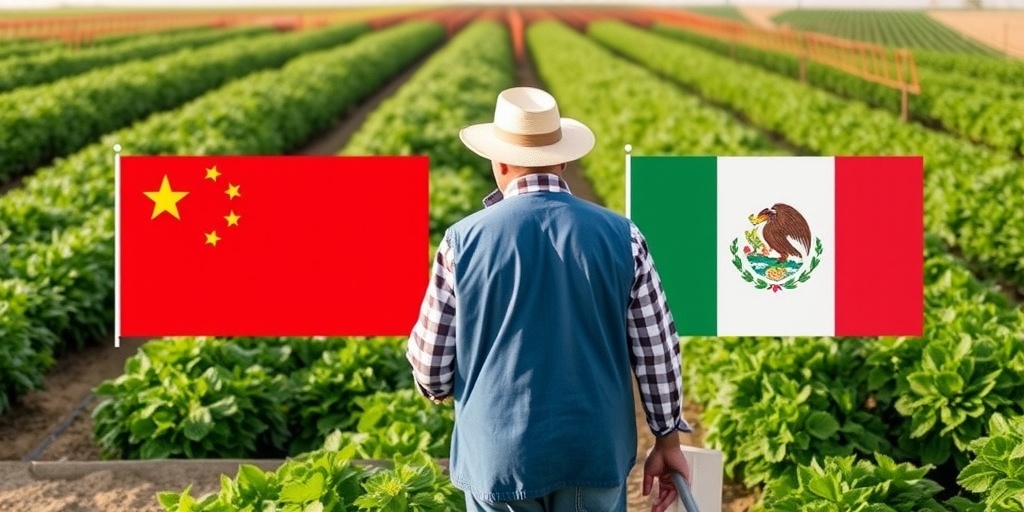Now Reading: How Retaliatory Tariffs from China, Canada, and Mexico May Hurt U.S. Farmers
-
01
How Retaliatory Tariffs from China, Canada, and Mexico May Hurt U.S. Farmers
How Retaliatory Tariffs from China, Canada, and Mexico May Hurt U.S. Farmers

Title: American Farmers Bracing for New Trade War Fallout
As tensions rise between the United States and China, American farmers find themselves once again in the crossfire, facing potentially dire repercussions from new tariffs. The situation is reminiscent of the trade war during President Trump’s first term, but experts warn that this time, the stakes could be even higher.
On Tuesday, China’s Ministry of Finance announced the imposition of tariffs as high as 15% on a broad array of food imports from the U.S., targeting crucial products like chicken, wheat, corn, and cotton. This move is part of China’s retaliation against rising tariffs on Chinese goods imposed by the Trump administration, which also includes 10% tariffs on American exports of sorghum, soybeans, pork, beef, aquatic products, fruits, vegetables, and dairy.
In response, Canada stated it would levy retaliatory tariffs of 25% on approximately $30 billion worth of American goods, while Mexico is expected to clarify its response shortly. The administration’s recent tariffs on these two nations have raised concerns among American farmers, who rely heavily on exports to sustain their businesses.
According to Lynn Kennedy, a professor of agricultural economics at Louisiana State University, farms are a primary target since agricultural exports make up a significant portion of U.S. trade. "Rural areas tend to be politically more conservative, which means they are often strongholds for the Republican base," Kennedy noted, highlighting the political motivations behind the tariff decisions.
The cascading effects of these retaliatory tariffs could lead to plummeting American exports and falling crop prices, as importers from China, Canada, or Mexico might turn to alternative suppliers like Brazil. Recent data from the USDA illustrates the significant role of these markets, with China accounting for about 14%—or $24.7 billion—of U.S. agricultural exports in 2024. Mexico and Canada also play a substantial role, importing $30.3 billion and $28.4 billion worth of goods respectively.
Mark Legan, a farmer from Putnam County, Indiana, expressed deep concern about the implications for his business. With Mexico being a primary market for his pork products and China the leading buyer of his soybeans, he is already feeling the pressure as both countries shift their purchasing strategies. "When China began sourcing soybeans from Brazil during Trump’s first term, my income significantly decreased," Legan shared. As he looks ahead, he worries about similar impacts from the ongoing tariff disputes.
Industry leaders quickly criticized the blanket tariffs, suggesting that they could backfire and harm the very farmers they are intended to protect. Shannon Douglass, president of the California Farm Bureau, cautioned against the risks of retaliation that could ensue. Similarly, Gregg Doud of the National Milk Producers Federation articulated concerns about new trade barriers hindering dairy sales, emphasizing the importance of competitive access to markets.
Canada’s retaliatory plan, though not explicitly outlined, reportedly includes targeting several U.S. products, such as orange juice and peanut butter, among others. Doug Ford, the premier of Ontario, highlighted his commitment to local economies by removing all U.S.-made liquor from the state alcohol distributor.
Farmers, ranging from small-scale producers to larger agricultural enterprises, may bear the brunt of falling prices coupled with rising production costs. Soybeans have been particularly vulnerable, representing about half of U.S. agricultural exports to China last year. As U.S. soybean futures dropped approximately 1% on the day of the tariff announcement, futures for corn and wheat also followed suit.
The planting season is upon farmers, but now uncertainty clouds their anticipated harvests. “Farmers have already planted their crops and were banking on certain prices,” noted Kennedy, adding that this unpredictability could significantly impact their earnings.
Challenges are compounded by the previous administration’s funding freezes, leaving many rural communities in a precarious position. Jill McCluskey, an agricultural economics professor at Washington State University, pointed out the pressing financial strains farmers are facing. "If they can’t sell their crops at competitive prices, they will feel the crunch," she warned.
Unexpected consequences from the tariffs are likely to emerge over time. Organic farmers, who typically depend on domestic sales and inputs, might initially benefit. However, as Kate Mendenhall of the Organic Farmers Association explained, rising machinery repair costs due to imported parts could quickly negate those advantages.
As the situation develops, Zippy Duvall, president of the American Farm Bureau Federation, stated that the economic burden of additional tariffs could become unbearable for some farmers. Nutrien’s chief executive, Ken Seitz, echoed this sentiment in a recent earnings call, predicting that U.S. farmers would feel the impact of tariffs after the spring planting season.
The history of U.S. agriculture reveals a pattern of strain during trade disputes. Previous retaliatory tariffs from China during Trump’s first term resulted in nearly $26 billion in losses for American agriculture, significantly diminishing soybean exports. Such tariff-induced losses can jeopardize farmers’ market share long-term, complicating their recovery once market conditions stabilize.
As farmers look to navigate these tumultuous waters, questions loom about the possible reintroduction of subsidies akin to those seen during the first trade war. While many farmers prefer to thrive through market sales rather than government assistance, they may have little recourse if market access continues to be restricted.
In the words of economist Betty Resnick, “Farmers want to make their money from the market, but with changing market access, they also need support to stay afloat.” As the ongoing saga of trade tensions unfolds, the long-term implications for American farmers remain uncertain, with many praying for a resolution that restores stability and market access.
Stay Informed With the Latest & Most Important News
Previous Post
Next Post
-
 01New technology breakthrough has everyone talking right now
01New technology breakthrough has everyone talking right now -
 02Unbelievable life hack everyone needs to try today
02Unbelievable life hack everyone needs to try today -
 03Fascinating discovery found buried deep beneath the ocean
03Fascinating discovery found buried deep beneath the ocean -
 04Man invents genius device that solves everyday problems
04Man invents genius device that solves everyday problems -
 05Shocking discovery that changes what we know forever
05Shocking discovery that changes what we know forever -
 06Internet goes wild over celebrity’s unexpected fashion choice
06Internet goes wild over celebrity’s unexpected fashion choice -
 07Rare animal sighting stuns scientists and wildlife lovers
07Rare animal sighting stuns scientists and wildlife lovers





















